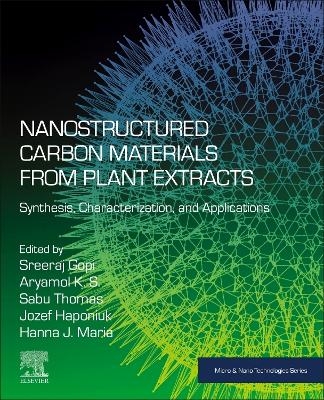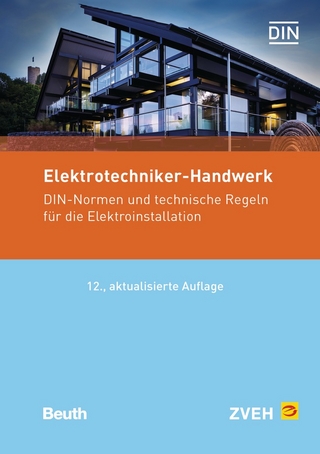
Nanostructured Carbon Materials from Plant Extracts
Elsevier - Health Sciences Division (Verlag)
978-0-323-95126-5 (ISBN)
- Noch nicht erschienen (ca. Januar 2025)
- Versandkostenfrei
- Auch auf Rechnung
- Artikel merken
Dr. Sreeraj Gopi is the Co-Founder and Director of Molecules Food solutions Pvt Ltd, Zingon Naturals Pvt Ltd. He was the Chief Scientist at Plant Lipids Pvt Ltd. and Chief Scientific Officer at Aurea Biolabs Pvt Ltd., He has also served as an adjunct professor at universities including Stockholm University, Sweden, Siberian Federal University, Russia, and Mahatma Gandhi University, India. He completed his doctorate in organic chemistry and nanotechnology, and nano drug delivery working in the area of natural products, isolation, and biological activities. He published more than 175 international articles and filed more than 75 patents, in the US and Europe. At Plant Lipids, he developed many innovative products and technologies, and is responsible for driving the research team to excellence, as well as, implementing new projects, presenting scientific seminars to various customers. He was listed world's top 2% scientist list by Standford University. Aryamol K. S. is a Project Fellow at the School of Energy Materials, Mahatma Gandhi University, India. Her area of specialization is quantum dots from natural resources for different applications, including biomedicine, bioimaging, and drug delivery. Professor Sabu Thomas is the Director of Centre for Nanoscience and Nanotechnology, Mahatma Gandhi University, Kottayam, Kerala, India. He is also currently the Chairman of the Trivandrum Engineering Science and Technology Research Park (TrESPARK), Trivandrum, Kerala, India. He was the former Vice Chancellor of Mahatma Gandhi University, Kottayam, Kerala, India. Prof. Thomas is a highly committed teacher and a remarkably active researcher well-known nationally and internationally for his outstanding contributions in polymer science and nanotechnology. He has published over 1400 research articles in international refereed journals. and has also edited and written 210 books. His H-index is 140 and total citations are more than 94,000. He has supervised 125 PhD theses. He has received many international and national awards and recognitions. Under the leadership of Prof. Thomas, Mahatma Gandhi University has been transformed into a top University in India. Prof. Jozef T. Haponiuk is Professor and Head of Department, at the Department of Polymer Technology, Gdansk University of Technology, Poland. Prof. Haponiuk is an experienced researcher in the fields of polymer composites, polymer blends, and associated materials. He has received a number of prizes and awards for his work. Dr. Hanna J. Maria is a Senior Researcher at the International and Inter University Centre for Nanoscience and Nanotechnology, Mahatma Gandhi University, India. She previously held postdoctoral research positions at the Centre for Advanced Materials, Qatar University, the Department of Mechanical Engineering, Yamaguchi University, Japan, the Centre RAPSODEE, IMT Mines, Albi, France, and the Siberian Federal University, Krasnoyarsk, Russia. Dr. Maria has published 20 articles and 10 book chapters, and co-edited 4 books. Her research has focused on natural rubber composites and their blends, thermoplastic composites, lignin, nanocellulose, bio-nanocomposites, nanocellulose, rubber-based composites and nanocomposites, and hybrid nanocomposites.
Part 1: Fundamentals of Nanostructured Carbon Materials from Plant Extracts 1. Introduction to nanostructured carbon materials from plant extracts 2. Bottom-up synthesis method for nanostructured carbon materials 3. Top-down synthesis method for nanostructured carbon materials 4. Synthesis of carbon nanomaterials from fruit extracts 5. Synthesis of carbon nanomaterials from vegetables 6. Synthesis of carbon nanomaterials from leaves and other plant sources 7. Functionalization of carbon nanomaterials from plant extracts Part 2: Properties and Characterization of Nanostructured Carbon Materials from Plant Extracts 8. X-ray scattering investigation of carbon nanomaterials from plant extracts 9. Neutron scattering investigation of carbon nanomaterials from plant extracts 10. Structural investigation of carbon nanomaterials by FTIR, UV, NMR and Raman spectroscopy 11. Mechanical properties of carbon nanomaterials 12. Crystallization behavior of carbon nanomaterials 13. Thermal characterization of carbon nanomaterials 14. Morphological characterization of carbon nanomaterials 15. Rheological studies of carbon nanomaterials 16. Dielectric and electrical conductivity studies of carbon nanomaterials 17. Simulation and multiscale modeling of carbon nanomaterials Part 3: Applications of Nanostructured Carbon Materials from Plant Extracts 18. Applications of carbon-based nanomaterials from plant extracts in aeronautics and space 19. Carbon-based nanomaterials from plant extracts in biological and biomedical applications 20. Applications of carbon-based nanomaterials from plant extracts in composite materials 21. Applications of carbon-based nanomaterials in agriculture sector 22. Green synthesized carbon nanomaterials in microelectronics 23. Applications of carbon-based nanomaterials from plant extracts in water desalination by capacitive deionization 24. Carbon based nanomaterials from plant extracts in hydrogen storage applications 25. Energy storage applications of carbon nanomaterials from plant extracts 26. Carbon nanomaterials from plant extracts in environmental remediation applications 27. Applications of carbon-based nanomaterials from plant extracts in water purification 28. Applications of carbon-based nanomaterials from plant extracts in nano fluid 29. Advantages and Disadvantages of Carbon Nanomaterials from Plant Extracts 30. Life cycle analysis of carbon nano structures and decorated carbon nano structures
| Erscheint lt. Verlag | 1.1.2025 |
|---|---|
| Reihe/Serie | Micro & Nano Technologies |
| Verlagsort | Philadelphia |
| Sprache | englisch |
| Maße | 191 x 235 mm |
| Themenwelt | Technik ► Elektrotechnik / Energietechnik |
| Technik ► Maschinenbau | |
| ISBN-10 | 0-323-95126-0 / 0323951260 |
| ISBN-13 | 978-0-323-95126-5 / 9780323951265 |
| Zustand | Neuware |
| Haben Sie eine Frage zum Produkt? |
aus dem Bereich


